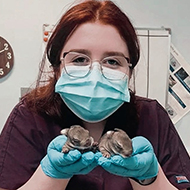
Emily Wallace is researching public opinion on breeding regulations.
A student at Harper Adams University is seeking the public's views on whether breeding regulations are necessary for brachycephalic dogs.
Emily Wallace, who is a final year BSc (Hons) Veterinary Nursing student, was inspired to discover whether the public believe breeding regulations are needed to cover brachycephalic dogs during a placement year at a Northumberland veterinary practice.
The study aims to identify the UK general public's perception and knowledge of brachycephalic breeds, and whether they are for or against the implementation of breeding regulations in the UK, similar to those in the Netherlands.
Commenting on the purpose of her study, Emily said: “Brachycephalic health and welfare concerns have increased drastically over the past decade alongside the popularity of these breeds.
“Other countries, such as the Netherlands, have implemented legal strategies to regulate breeding of these dogs in attempts to improve their health via selective breeding for various beneficial physiological features that include longer noses and less stenotic nostrils, rather than the trademark brachycephalic ‘flat-face’ that is associated with a higher risk of health issues.
“An example of this regulation includes a requirement for professional veterinary approval of the conformation of the dogs for them to be allowed to breed.
“Dogs that do not meet the criteria on health welfare will not be allowed to pass on these features to further animals; therefore, selectively breeding out health detrimental physical features.”
The survey consists of multiple choice questions, dichotomous questions, demographic questions and open-ended questions, and all data collected will be anonymous.
“It is understandable that there will be conflicting opinions on such regulation,” Emily added.
“A lot of brachycephalic dogs make wonderful companions, and the study is not to overrule their existence, but instead identify awareness and contribute to welfare advancements so that they can live the happiest and healthiest lives possible, whether that be in the form of regulations or not.
“I believe that attaining information, such as this, on public knowledge and opinion will allow veterinary professionals and regulatory bodies to devise appropriate and effective plans to support these animals as much as possible.”
The questionnaire for Emily's study, 'Should brachycephalic dog breeding be regulated in the UK', can be accessed here.
Image (C) Harper Adams University



 The Veterinary Medicines Directorate (VMD) is inviting applications from veterinary students to attend a one-week extramural studies (EMS) placement in July 2026.
The Veterinary Medicines Directorate (VMD) is inviting applications from veterinary students to attend a one-week extramural studies (EMS) placement in July 2026.